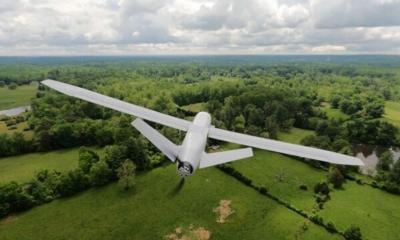Wed, Jun 05, 2024
Another Day, Another AFWERX Contract
The Air Force's toy box has granted a contract for $10 million to UASD developer RapidFlight, specifically to 'develop and produce a 3D-printed, autonomous, fixed-wing aircraft system.'

The resulting UAS will be called the SPX, a relatively bland looking fixed wing, v-tail, tubular drone that would hardly warrant a second glance on the ramp today. But, the USAF seems to believe the SPX is something special, describing the contract as "bringing cutting-edge American ingenuity from small businesses and startups to address its most pressing challenges." Autonomy Prime has been their current pet project, looking to leverage commercial advancements just as they ripen on the commercial end. So far, the info about the upcoming SPX is... mostly nonsensical AFWERX jibber-jabber full of six-syllable words and futuristic sounding tech in the abstract.
"Autonomy Prime is excited about this innovative approach to unmanned autonomous aviation," said Josh Fehd, AFWERX Autonomy Prime branch chief. "It represents a promising opportunity to continue our mission of creating a rapid, affordable, and iterative autonomy testing and transition capability for the DAF."
Okay, at the very least we can piece together a few facts: The contract's Phase 1 will put RapidFlight to the grindstone designing SPX UAVs for T&E at the Autonomy Prime Proving Ground, after which it will conduct demonstrations of its performance before the USAF at their corporate flight test facility. Throughout the process, RapidFlight will train USAF operators on "comprehensive operations and maintenance training". So it largely sounds like... any other fixed-wing UAV system. But, RapidFlight is making use of some of that newfangled nimble development, allowing them to "reduce design-to-manufacture time and platform costs" by "up to 80%".
The current iteration of the SPX is a Group 2 UAS with 12 pounds of payload and a 150-nm range, with modularity underneath to account for a wider range of cargo, sensors, and autonomy plugins. They plan to use the RapidFlight Common Avionics 2.0 modular interface and their "AgileAviation" process to gallop along in their development process to hopefully complete the SPX in about 7 months.
More News
He Attempted To Restart The Engine Three Times. On The Third Restart Attempt, He Noticed That Flames Were Coming Out From The Right Wing Near The Fuel Cap Analysis: The pilot repor>[...]
Make Sure You NEVER Miss A New Story From Aero-News Network Do you ever feel like you never see posts from a certain person or page on Facebook or Instagram? Here’s how you c>[...]
From 2009 (YouTube Edition): Leading Air Show Performers Give Their Best Advice for Newcomers On December 6th through December 9th, the Paris Las Vegas Hotel hosted over 1,500 air >[...]
Aero Linx: NASA ASRS ASRS captures confidential reports, analyzes the resulting aviation safety data, and disseminates vital information to the aviation community. The ASRS is an i>[...]
“For our inaugural Pylon Racing Seminar in Roswell, we were thrilled to certify 60 pilots across our six closed-course pylon race classes. Not only did this year’s PRS >[...]
 NTSB Final Report: Rutan Long-EZ
NTSB Final Report: Rutan Long-EZ ANN FAQ: Turn On Post Notifications
ANN FAQ: Turn On Post Notifications Classic Aero-TV: ICAS Perspectives - Advice for New Air Show Performers
Classic Aero-TV: ICAS Perspectives - Advice for New Air Show Performers ANN's Daily Aero-Linx (06.28.25)
ANN's Daily Aero-Linx (06.28.25) Aero-News: Quote of the Day (06.28.25)
Aero-News: Quote of the Day (06.28.25)



